- News
- Reviews
- Bikes
- Components
- Bar tape & grips
- Bottom brackets
- Brake & gear cables
- Brake & STI levers
- Brake pads & spares
- Brakes
- Cassettes & freewheels
- Chains
- Chainsets & chainrings
- Derailleurs - front
- Derailleurs - rear
- Forks
- Gear levers & shifters
- Groupsets
- Handlebars & extensions
- Headsets
- Hubs
- Inner tubes
- Pedals
- Quick releases & skewers
- Saddles
- Seatposts
- Stems
- Wheels
- Tyres
- Tubeless valves
- Accessories
- Accessories - misc
- Computer mounts
- Bags
- Bar ends
- Bike bags & cases
- Bottle cages
- Bottles
- Cameras
- Car racks
- Child seats
- Computers
- Glasses
- GPS units
- Helmets
- Lights - front
- Lights - rear
- Lights - sets
- Locks
- Mirrors
- Mudguards
- Racks
- Pumps & CO2 inflators
- Puncture kits
- Reflectives
- Smart watches
- Stands and racks
- Trailers
- Clothing
- Health, fitness and nutrition
- Tools and workshop
- Miscellaneous
- Buyers Guides
- Features
- Forum
- Recommends
- Podcast
news
Eurobike First Ride: Canyon Ultimate CF SLX
Canyon have redesigned their Ultimate CF SLX bike for 2013 so that – surprise, surprise – it’s lighter and stiffer than ever and also, they say, more comfortable than before - which is a neat trick if you can do it. We were lucky enough to bag a ride on the new model at Eurobike last week…
This isn’t just a cosmetic redesign by any means. Canyon have spent 18 months working on the engineering here and have incorporated changes that bring the frame weight down to a claimed 790g – and that’s in a size L. Anything under 1kg is very light. Below 800g and you’re talking mega-light. The combined weight of the frame, fork and headset is just 1,190g, according to Canyon’s figures.
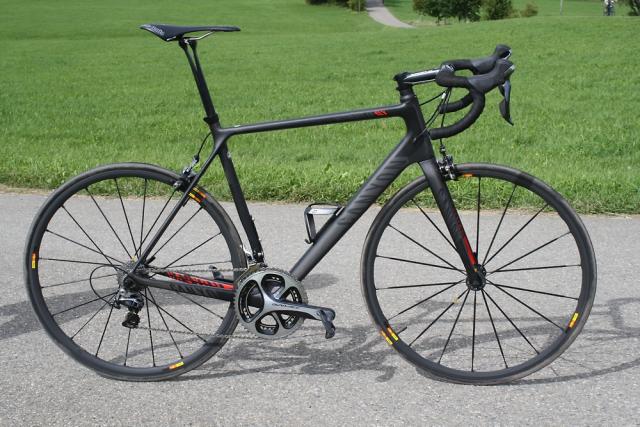
How have they removed the weight? We spoke to Canyon’s Development Engineer Wolfgang Kohl who told us that they’ve redesigned the dropouts on both the frame and fork – this is the first Canyon road bike with full-carbon dropouts – and they’ve gone for a press fit bottom bracket with a carbon rather than aluminium housing.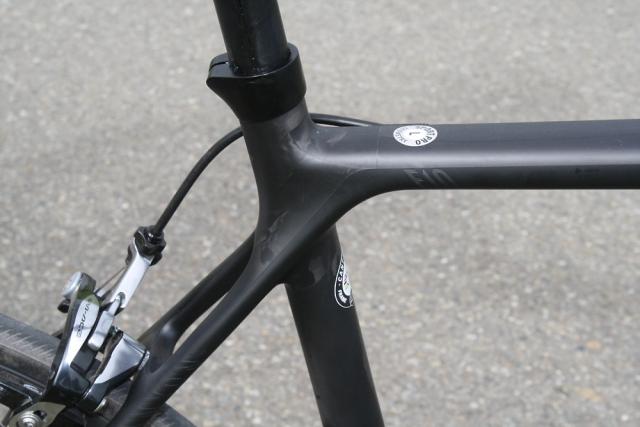
Canyon have also flattened the top tube, reducing the surface area and the amount of material used, and they now include more ultra high modulus carbon fibres than before. Canyon’s Maximus seat tube, which bulges out for extra rigidity on the non-driveside but stays narrow for extra space on the driveside, has been made slimmer than before too, and the lower section follows the profile of the rear wheel.

Canyon are keen to emphasise that this hasn’t resulted in the loss of any stiffness. The chainstays, seatstays and fork legs are all set further apart than previously – they’re kept wide for longer – for extra rigidity.
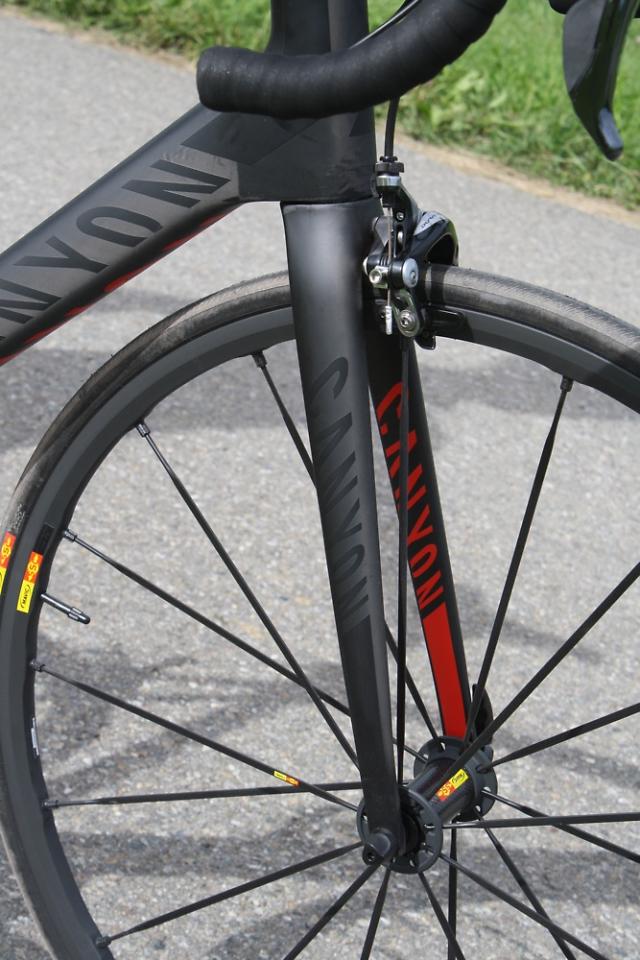
Those fork legs are a little more slender than before, by the way – they’re not so deep from front to back. The idea there is to increase comfort.
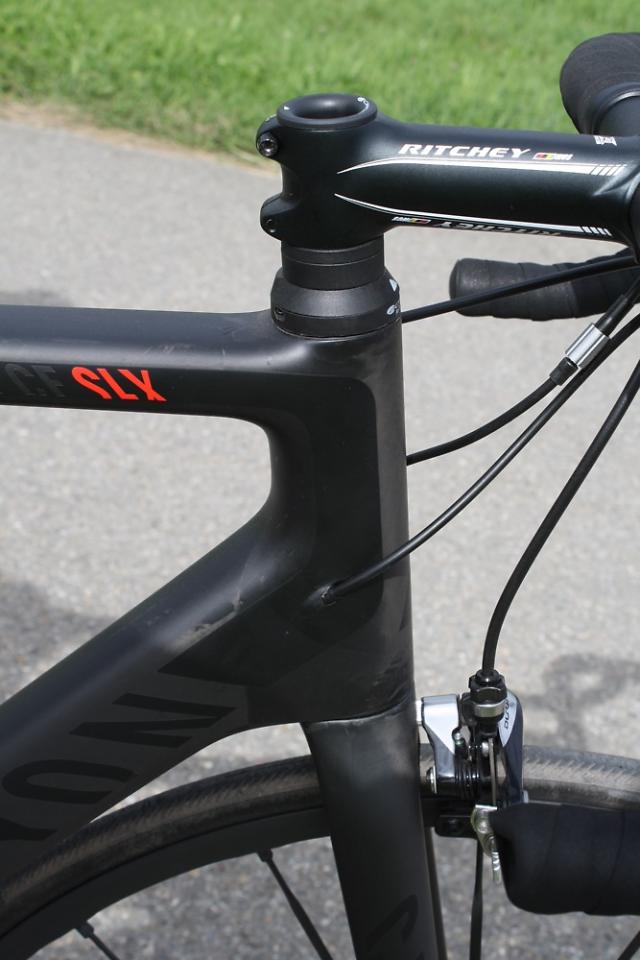
Canyon now route the cables internally for the first time, bringing the Ultimate CF SLX into line with most other top-level race bikes out there – Team Katusha will be on this bike next year. They’ve also redesigned the front derailleur clamp. Shimano use a supporting screw on their latest Di2 and Dura-Ace 9000 mechs and Canyon’s new clamp features an integrated plate for this to tighten against.
Speaking of Di2, Canyon have taken the decision to offer the frame in two slightly different versions depending on whether you want to run electronic shifting or go with mechanical. Rather than having redundant features, this will give a slightly cleaner look.
So, that’s just a brief rundown of some of the key changes. As you can see, although the 2013 Ultimate CF SLX is clearly related to the previous model, it has had a major redesign.
It’ll be available in several different versions with high-end groupsets: Shimano Dura-Ace Di2, Dura-Ace mechanical, Ultegra, Campagnolo Super Record EPS, Campag Record and SRAM Red.
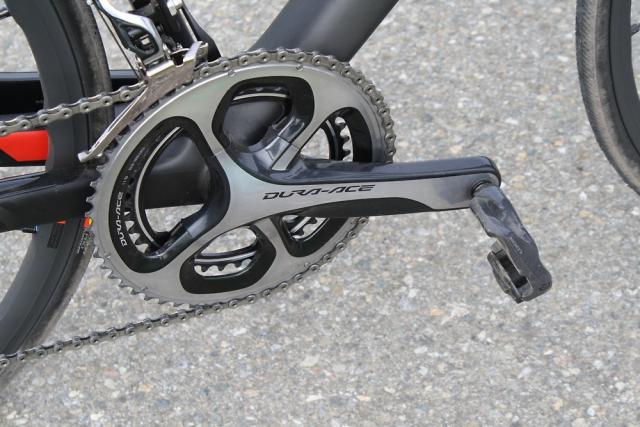
The version we have here is the Ultimate CF SLX 9.0 with a Dura-Ace 9000 mechanical group, Mavic Ksyrium SLR wheels, and a Ritchey WCS carbon bar and stem.. You buy Canyon bikes direct from them via their website rather than going through dealers, although we don’t yet have prices.
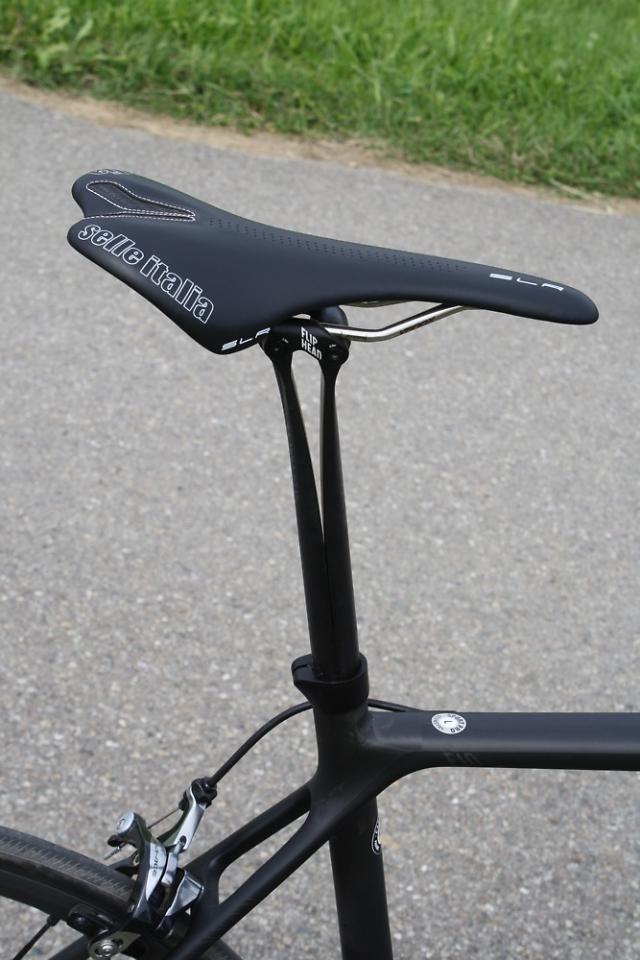
On climbing aboard one of the first things I noticed, unusually, was the seatpost so let’s cover that to begin with…
Our bike was fitted with Canyon’s innovative new VCLS Flat Spring Post (VCLS Post 2.0) which we first saw at Eurobike last year. It’s available as an option on every 2013 Canyon road bike. VCLS stands for ‘vertical comfort, lateral stiffness’, the idea here being to provide a degree of give to filter out vibration as you ride.
It’s a clever design. The post is made in two parts with a split right down the centre. The halves can move independently – they’re two flat springs, with the Flip Head saddle clamp attached to each part. When you hit a bump, the post can move – Canyon reckon by 20-25mm, and the saddle stays horizontal thanks to that Flip Head,
You can probably get a much clearer idea of how it works by simply looking at the picture. The big question, though, is: does it work?
Well, here’s the thing: it does. There’s no question about it. If you purposely sit down really hard on the saddle, you can feel the seatpost flex slightly and then straighten up. And if you direct the bike over manhole covers, drains and the like – purely in the name of research, of course – there’s just a little bit of movement to soften the blow. It’s not a gimmick – it actually works and it weighs a highly reasonable 195g. If you’re worried that the post might flex from normal pedalling, don’t. I didn’t feel anything like that.
Back to the bike itself… we reviewed the Canyon Ultimate CF SLX 8.0 last year and found it to be remarkably efficient, precise, and very responsive. Our initial ride suggests that this updated version scores more highly on all of those fronts.
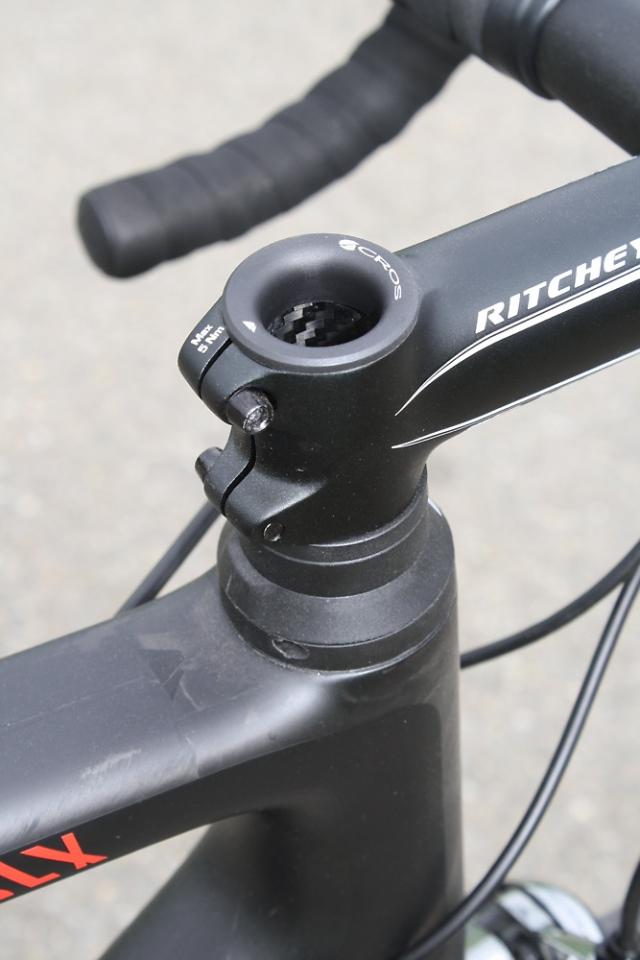
This is a super-fast bike that responds instantly when you put the power in. It climbs beautifully and springs forward if you up the tempo. As promised by the designers, the bike has retained Canyon’s trademark stiffness and that fills you with confidence from the first pedal stroke. Bigger, more powerful riders in particular will love the ride.
As we say on most of our First Rides from Eurobike, we don’t have long enough on the bikes to comment on long-ride comfort and the roads are so glassy-smooth in southern Germany that it’s hard to make a judgment anyway. That said, I’m pretty confident that the VCLS Post 2.0 will deal with bumpy roads just fine to keep you unshaken in the saddle.
Mat has been in cycling media since 1996, on titles including BikeRadar, Total Bike, Total Mountain Bike, What Mountain Bike and Mountain Biking UK, and he has been editor of 220 Triathlon and Cycling Plus. Mat has been road.cc technical editor for over a decade, testing bikes, fettling the latest kit, and trying out the most up-to-the-minute clothing. He has won his category in Ironman UK 70.3 and finished on the podium in both marathons he has run. Mat is a Cambridge graduate who did a post-grad in magazine journalism, and he is a winner of the Cycling Media Award for Specialist Online Writer. Now over 50, he's riding road and gravel bikes most days for fun and fitness rather than training for competitions.
Latest Comments
- tony.westclassics@live.co.uk 5 min 54 sec ago
I use old inner tubes to tie up trees/plants to holding post/stick, they stretch and dont dig into plant
- tony.westclassics@live.co.uk 11 min ago
All these wheels in part are maufactured in Far East, maybe not the hub, but the rim, so why buy just to get thier name on them, ive just purchased...
- David9694 35 min 3 sec ago
“Car is king” I’m often told, but it appears to be scared of gaining new subjects....
- matthewn5 38 min 16 sec ago
Yeah +1 for geometrygeeks, it's the best way to work out whether a bargain bike frame will actually fit you. Surprising how reach can vary with...
- Steve K 41 min 4 sec ago
We support cycle lanes - ...
- hawkinspeter 57 min 13 sec ago
Park Street car ban scheme not 'solving problem but moving it': https://www.bristolpost.co.uk/news/news-opinion/park-street-car-ban-scheme-10049226
- chrisonabike 1 hour 41 sec ago
Sounds counterintuitive but I think fixing the legal system would be harder than fixing the street design and rules - and might even cost more!...
- aramaerospace 4 hours 41 min ago
Increased drive friction and power loss:...
- Geoff H 6 hours 49 min ago
I was really enjoying the article until I came to the price!
- OldRidgeback 7 hours 42 min ago
I have a very old MTB (guess what make) that I'll happily leave locked at the train station or shops or whatever. The fairly new Trek MTB or...











Add new comment
11 comments
I have had the R3 base 2011 (I know you said 2010 but may be of help) and broke it, drop out cracked. Now got the 2012 CF SLX 8. I can honestly say that Canyon beats it hands down. Quicker I have timed it over same routes. Pick up out of corners and sprinting is faster. R3 feels dull. Yes it is slightly ( marginally) more comfortable but the whole feeling of the Canyon is faster. Better looking but that is just personal.
Bigger head tube on Canyon but I am no pro and the pro use the same frame.
Have no fear buy the Canyon and get a complete bike for the price of a R3 frame
Thanks for reply, I train on the roads between Clapham and Hampton/Richmond and the roads are pretty dreadful in places thats why ride is so important. Saying that I found your post really helpful so maybe I'll take the plunge. Thanks again.
Hi guys could you hazard an opinion on this new Canyon vs Cervelo R3? I appreciate it's hard to compare especially after a short ride but for me the R3 (not the new Team one which seems to have taken a backward step in its lay up with a lesser ride quality, but the 2010 model) is the benchmark in stiffness, weight and ride quality. Have been thinking of a new frame for a while and am attracted to the understated Canyon image, but no point changing if a backward step?
I've read all about the 'stack and reach' measuring philosophy with Canyon. I know because of my proportions that I would end up with a top tube of a good size but seat tube too long, or go for a smaller size where the bike looks too small for me. We're not all six footers, you know?
There was nothing wrong with the way this year's SLX was offered, every 2cm, just like Colnago, and they haven't gone out of business, you know?
I was under the impression the constant STA across the range for the new geo is more beneficial for the smaller sizes? I haven't drawn them out, but from the numbers it would appear the new geo offers a more linear progression in the sizes?
Hi all,
Canyon say this about the geometry: "The Canyon Ultimate CF SLX incorporates the proven Canyon SPORT PRO geometry, meaning that the bike offers a sportily-extended seating position that is not too extreme."
londonplayer, for sizing I'd be about halfway between the size L (58cm) and XL (60cm).
The geometries have altered a bit, but very little for the L/58cm version. This model comes with a 570mm seat tube, 566mm top tube and 170mm head tube. Stack is 579mm and reach is 394mm.
For the XL/60cm those measurements (in the same order) are 595mm, 583mm, 190mm, 598mm and 405mm.
Why canyon have changed the geometries of the 2013 CF SLX from 52-54-56 etc. to S, M, XL etc. is beyond me.
These generic sizes are not going to fit as many riders imo, great shame.
Having said that it's such a damn sexy frame.
It's just a letter over a number? The 2013 SLX is going to be available in 7 sizes. The current SLX is available in 8.
I remember reading that the 2013 SLX will follow the same geometry as the 2012 Ultimate AL (Sport Pro Geo), which is also available in 7 sizes.
For reference to Canyon sizing; I've a 2012 Ultimate AL 56/M with a 100mm stem. I'm 178cm with a shorter torso.
if it helps, i'm 5 foot 11 with quite a long body, and i ride a 56cm frame which fits me with an 11cm stem, but i am considering moving to a 12cm
Matt,
If this is a 58cm like the previous one, is it big enough for you? I'm 1.88m and I was thinking of ordering a 60cm Canyon. Just wondering because the only way I will find out is after I've got it delivered!
Oh my.. want that. Heard some things on the internet... things like a lot stiffer than current SLX. Oh my.
Londonplayer - I am about 189 and have the 60cm canyon CF. Their TT is a bit shorter than usual for a given ST length as well. For example a 58cm tarmac/allez has 582mm TT whereas CF/SLX will have 575.5mm for 60cm.
One thing to consider though - you can only change the stem once after getting the bike. I ended up having to buy a -17 stem from them as the stock was way to high, and even though there are a few other 1.25 stems out there, not many -17 that are okay for CF. Some mixed things about the spesh and syntace f119.